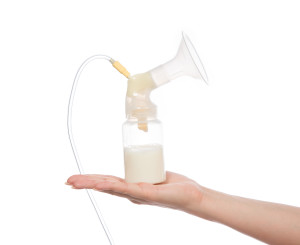 The number of moms choosing to breastfeed has risen roughly 12% since 2000. About 80% to 85% of babies breastfed for a portion of time, with about 35% breastfed for more than a year. The American Academy of Pediatrics (AAP) and the American College of Obstetricians and Gynecologists both strongly recommend breastfeeding.
The number of moms choosing to breastfeed has risen roughly 12% since 2000. About 80% to 85% of babies breastfed for a portion of time, with about 35% breastfed for more than a year. The American Academy of Pediatrics (AAP) and the American College of Obstetricians and Gynecologists both strongly recommend breastfeeding.
Benefits to the baby include infant nutrition, gastrointestinal function, and a better well-being. Additionally, breastfed infants have reduced risk of infectious disease, sudden infant death syndrome, otitis media, and respiratory infections, as compared to formula-fed babies. Breastmilk contains the ideal mix of nutrition for your baby blending nutrients, fat and protein. In addition, a woman’s body will adapt to a growing baby and will adjust the correct proportions of ingredients. Breastfeeding can also reduce the risk of childhood obesity.
While the benefits to the baby are well-known and frequently discussed in society, the benefits to the mothers are usually less widespread. However, breastfeeding can be particularly good for moms as well. Breastfeeding has been linked to lowering a woman’s risk of many diseases, including type 2 diabetes, hypertension, myocardial infraction, coronary artery disease, and certain types of cancer.
Women who breastfed for 12 months or more had a 15% decreased risk of type 2 diabetes and 12% reduced risk of hypertension. Myocardial infraction and coronary heart disease risk can be reduced by 23% for women who breastfed for two or more years. Additionally breastfeeding can reduce the risk of breast, ovarian, and endometrial cancers by 20% to 37%. Studies have shown risks of cancer reduced by 10% to 15% for every 12 months of breastfeeding.
In addition to lowering the risk of disease and cancer, breastfeeding can decrease postpartum bleeding and increase the uterine involution. While a healthy diet with plenty of water, fruits, vegetables, lean protein, and whole grains is recommended, breastfeeding can also help women lose baby weight.
Exclusive breastfeeding is recommended during the first six months of life, with the introduction of complementary foods during months six to 12. Keep in mind, birth practices can help promote successful breastfeeding. Experts recommend that skin-to-skin mother and baby contact should be initiated at birth and women should begin breastfeeding within an hour of birth. Newborns should not be given outside food or drink unless medically indicated. Women that breastfeed should be encouraged to avoid using pacifiers or artificial nipples.
Sources:
https://www.mdedge.com/obgyn/article/190488/obstetrics/maternal-health-benefits-breastfeeding/page/0/1?channel=262
https://www.aap.org/en-us/advocacy-and-policy/aap-health-initiatives/Breastfeeding/Pages/Benefits-of-Breastfeeding.aspx
Benefits of Breastfeeding
More
 Whether you are a first time mom, or are realizing that each child develops differently, a woman can experience difficulties breastfeeding at any time. Though breastfeeding is a natural process and is one that is best for both you and your baby, do not be frustrated or disappointed if it does not seem to come easily. What follows is a list of six of the most common breastfeeding issues and tips for overcoming each one.
Whether you are a first time mom, or are realizing that each child develops differently, a woman can experience difficulties breastfeeding at any time. Though breastfeeding is a natural process and is one that is best for both you and your baby, do not be frustrated or disappointed if it does not seem to come easily. What follows is a list of six of the most common breastfeeding issues and tips for overcoming each one.
Latching pain – Nipple discomfort is common when a woman first begins to breastfeed, especially for new mothers. If pain lasts more than the first minute after your baby latches, however, check your positioning. The optimal position is for the baby’s mouth to cover more of the areola below your nipple than above. When correctly positioned, baby’s chin and nose should touch your breast with his lips splayed out so that you cannot see your nipple.
Clogged ducts – The ducts of your nipples may clog if your breast milk is not completely draining after nursing. If your ducts are clogged, you may feel a hard lump on your breast, or your breast may be sore to the touch. If you begin to feel feverish and achy, you could have an infection, and should see your doctor. To help your body to clear the blockage, be sure to get enough rest, apply warm compresses to your breasts, and massage them to stimulate milk movement.
Thrush – This is a yeast infection in your baby’s mouth, which can spread to your breasts. Symptoms include itchiness, soreness, and rash. You will need an antifungal medication for both your nipples and your baby’s mouth to treat the infection.
Cracked nipples – If you find that your nipples are producing a bloody discharge during breastfeeding or pumping, know that it will not harm your baby. Cracked nipples could be caused by latching problems, improper breast pumping, dry skin, or thrush. To lower your risk for developing cracked nipples, check your baby’s positioning. You may also want to try breastfeeding more frequently but for shorter periods of time. Until your skin heals, treat your skin with clean water or an over-the-counter lanolin cream made especially for nursing mothers.
High milk supply – Also known as engorgement, having a high supply of breast milk could make it difficult for baby to latch to the breast. To help your baby latch, first try hand-expressing some milk to begin the flow and soften the breast. Breastfeeding more frequently may also help keep milk levels in check.
Mastitis – This bacterial infection in your breasts can be caused by cracked skin, clogged ducts, or engorgement. Mastitis causes pain and flu-like symptoms, including fever. Antibiotics will be needed to treat the infection. Also try applying a hot compress to the breast and empty your milk supply frequently.
If you experience any of these conditions or issues while breastfeeding, speak to your OBGYN. Breastfeeding should offer an important emotional bonding opportunity for you and your baby and should not be a cause of stress, discomfort, or health risk. For more on this topic, please visit the breastfeeding section on the patient education part of our website or check out these breastfeeding resources in Western New York.
More
By admin
23 Dec, 2013
Breastfeeding support, Pregnancy
breastfeeding classes Buffalo, breastfeeding classes Western New York, breastfeeding support WNY, Dr. Carola Bagnarello, Dr. Christian Chouchani, Dr. Gabriel Chouchani, Dr. Magdi Sayegh, lactation consultants Buffalo, lactation consultants Western New York, nursing support WNY, WNY OB-GYN
 Everyone thinks that because breastfeeding is natural, that it’s easy. But experienced nursing moms can tell you—it’s not always! If you’re planning to breastfeed, you’re probably going to need some support. Where are your best resources in Western New York?
Everyone thinks that because breastfeeding is natural, that it’s easy. But experienced nursing moms can tell you—it’s not always! If you’re planning to breastfeed, you’re probably going to need some support. Where are your best resources in Western New York?
At the Hospital
When you give birth at Mercy Hospital, Millard Fillmore Suburban, Women and Children’s Hospital of Buffalo or Sisters Hospital, you can expect to receive support from an onsite lactation consultant. Be sure to tell the staff when you arrive that you plan to breastfeed after your baby is born, so they can help you get started correctly, right away.
Most of these facilities also offer breastfeeding classes as part of their preparation courses for new parents-to-be. These classes are taught by experienced, internationally board certified lactation consultants and are designed to help answer common questions and concerns that you may experience during pregnancy. They should prepare you for both the initial breastfeeding experience and what to expect during the first few weeks at home.
At Home
However, we all know that what works one day might not work the next. If you were doing well with breastfeeding at the hospital but things don’t seem to be going right now, or if you just want some reassurance, both Sisters and Mercy hospitals have the Baby Café, a weekly drop-in center where you can get support and guidance from certified lactation consultant nurses.
You can also ask your child’s pediatrician if they have a lactation consultant on staff. Care Connections, a lactation center located in Amherst that serves all eight counties of WNY, provides lactation consultant services for over 35 local pediatricians.
Care Connections also offers home visits by their IBC-certified lactation consultants in addition to onsite breastfeeding consultations. And if you can make the drive to their Amherst location, they rent breast pumps and sell a variety of clothing and accessories designed to make your breastfeeding experience easier.
At Work
If you’ll be returning to work and plan to continue nursing, Millard Fillmore Suburban offers a special class called Breastfeeding and the Working Mother, which will help you prepare to return to work by teaching you to use your breast pump and store your breast milk.
And if you have a question in the middle of the night, there are several great websites out there full of helpful information. Try:
At Chouchani, Sayegh and Bagnarello, MD, we strive to prepare and support all of our patients who want to breastfeed to have a successful experience. In fact, we want any woman who wants to breastfeed to have a successful experience! Please contact us if you have any questions. Our team is here for you before, during and after your pregnancy.
More
 The number of moms choosing to breastfeed has risen roughly 12% since 2000. About 80% to 85% of babies breastfed for a portion of time, with about 35% breastfed for more than a year. The American Academy of Pediatrics (AAP) and the American College of Obstetricians and Gynecologists both strongly recommend breastfeeding.
The number of moms choosing to breastfeed has risen roughly 12% since 2000. About 80% to 85% of babies breastfed for a portion of time, with about 35% breastfed for more than a year. The American Academy of Pediatrics (AAP) and the American College of Obstetricians and Gynecologists both strongly recommend breastfeeding.

